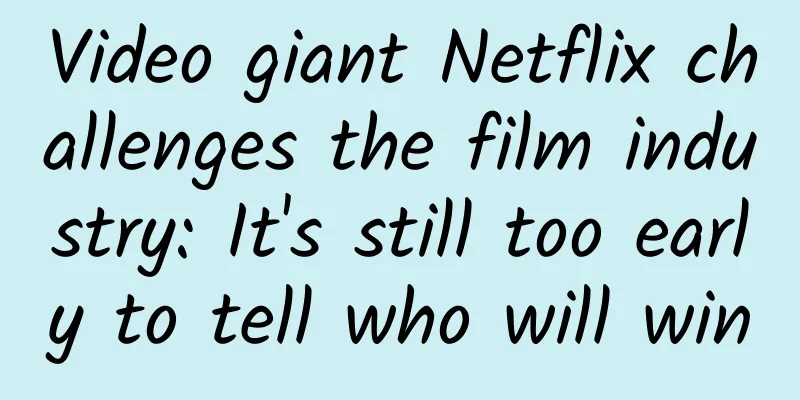Video giant Netflix challenges the film industry: It's still too early to tell who will win

|
"As expected, House of Cards continued to be completely defeated, and Hollywood's killing stick against new players was blatant." This was Gao Xiaosong's comment a year ago on Netflix's self-produced drama House of Cards' failure to win the Emmy Awards. A year later, this video streaming company, which has 57 million users in 50 countries, expanded from TV series to the film industry, and of course inevitably faced a new round of attacks from the traditional film industry. Netflix released its second quarter financial report for fiscal year 2015 early this morning Beijing time. The report shows that Netflix's second quarter revenue was $1.64 billion, higher than $1.34 billion in the same period last year; net profit was $26.3 million, down 63% from $71 million in the same period last year. For Netflix, which is in urgent need of expanding revenue scale and profit channels, entering the film industry is imperative. In March of this year, Netflix spent $12 million to buy the new film "Beasts of No Nation", which has been available for online on-demand service. When the company tried to release it online simultaneously in theaters, it was jointly boycotted by the four major North American theater chains: Emperor, AMC, Carmike and Cinemark. Crouching Tiger, Hidden Dragon 2, which was originally scheduled to be released simultaneously on Netflix and Imax on August 28, has been postponed to next year. Top theater chains including AMC and Regal Cinemas have said they will refuse to show it in their own theaters. The journey of video websites to disrupt the film industry has just begun, but they have already encountered fire from all sides. Close combat with traditional cinemas In the traditional model, Hollywood movies have a "window period principle", which means that movies can only be played on TV and the Internet 90 days after they are released in theaters. It is this rule that guarantees the income of traditional theaters. At this time, the attempt of video websites to "release them online at the same time" is undoubtedly a challenge to traditional theaters and a huge harm to their interests. Netflix Chief Content Officer Ted Sarandos once stated at the 5th China-US Film Summit: "Film distribution is still too obsessed with the old-fashioned operating model, which is unreasonable for consumers. The forced lag in time is even written into the law in France and some regions. So we decided that instead of buying broadcasting rights behind TV, we should do something to accelerate the dramatic change of the business model." He firmly believes that "the era of strictly distinguishing various distribution formats of films must end." Compared with traditional cinemas, the advantages of online distribution are that it increases the chances of film releases and the long-tail effect. Last year, the United States produced about 400 films, and about 200 were released. Last year, China produced more than 700 films, and only about 200 were released. For those films that cannot be released in theaters, online channels are a good place to go. The long-tail effect of video websites is a new gold mine for movies. Richard Gelfond, president of IMAX, is very confident about Crouching Tiger, Hidden Dragon 2. He said: "On video websites, a movie can be screened much longer than we thought." Releasing movies on video streaming is not new, but in the eyes of Hollywood, only when a movie is doomed to fail in theaters will it be considered for release on video-on-demand platforms. Of course, some small theaters don't care about Netflix's film plans. Tim Rigg, head of Alamo Drafthouse Theaters, said: "I will show the movies I want to show, regardless of the film company's distribution strategy." The attitude of film practitioners is unclear In addition to the traditional theaters with conflicting interests, the filmmakers themselves will inevitably be affected to a certain extent. The pay contracts between Hollywood movie stars and production companies usually include two parts: the advance payment paid to the actors before filming begins and the box office dividends received by the actors after the film is released. The latter is much more important than the former. Take Sandra Bullock, the heroine of Gravity, for example. She earned $70 million with Gravity, of which the advance payment was $20 million, and the subsequent dividends were 15% of the global box office profits, about $45 million, and the rest were dividends from peripheral profits such as DVDs. But under Netflix's rules, actors only receive advance payments, but no dividends. Because as of now, even if Netflix's movies are released in traditional theaters, they will only be shown in a few theaters, and the box office revenue generated by these theaters is almost a drop in the bucket. In Hollywood, which is accustomed to dividends, it is difficult to get stars to give up this huge income. Of course, for filmmakers, choosing to work with Netflix is a gamble. Netflix will not have any syndicated sales of programs, which means that Netflix will not allow filmmakers to allow multiple submissions or distribute them internationally. However, Netflix offers a generous advance payment, which is enough to guarantee the interests of the partners if the movie does not sell well. The model has its pros and cons, and filmmakers have different attitudes towards Netflix's new model. David Ayer, the director of Fury, said he was "absolutely" likely to be lured away by online distributors for future projects. "The screens we watch content on are moving toward handheld and portable," he said. "That's the future of business." Ayer added that he hoped online streaming platforms would give him the same artistic freedom as traditional film studios. And writer and screenwriter Ned Benson said, "I still believe in the movie theater model and the movie-going experience." Breakthrough: Own films + independent films Netflix’s usual practice is to own copyrights. Netflix once released its own copyrighted American TV series “House of Cards” at one time, becoming a “catfish” in the TV industry. In the film industry, owning copyrights is equally important, which will reduce a lot of burdens for Netflix. It is estimated that Netflix spends up to $40 million on each Adam Sandler movie. This cost is equivalent to the cost Netflix pays for the broadcasting rights of movies from Hollywood producers such as DreamWorks a few months after the movie is released. It can be seen that Netflix's move to own copyrights is not groundless, but the result of comprehensive consideration of costs, autonomy and other aspects. It is worth noting that in this regard, China has already walked ahead of Netflix. Chinese Internet companies have set up their own "film companies" and directly participated in key links such as film investment and publicity. Internet film companies put their own invested films on their own platforms. In addition, China's traditional theaters are not as powerful as those in the United States, and the audience has long developed the habit of watching online. For many reasons, China's "Internet + Film" is developing very fast. The road to entering the American film industry is so bumpy that Netflix has prepared another way for itself to "break in by force": independent films. At the beginning of 2015, Netflix announced a series of original film plans, including signing four original films with Adam Sandler and an environmental documentary. The aforementioned "Beasts of No Nation" and another "Jadotville" starring Jamie Dornan, who became famous with "Fifty Shades of Grey", are both projects signed by independent film producers of Netflix. Compared to the huge difficulty and cost of negotiating with big-budget movies, working with independent films seems to be a more suitable first step for Netflix. However, no matter what means are used, the clarion call for change has been sounded. Netflix CEO Reed Hastings revealed that Netflix will have 20 or more original films in 2016, and these films will also be available to viewers through streaming services. As a winner of Toutiao's Qingyun Plan and Baijiahao's Bai+ Plan, the 2019 Baidu Digital Author of the Year, the Baijiahao's Most Popular Author in the Technology Field, the 2019 Sogou Technology and Culture Author, and the 2021 Baijiahao Quarterly Influential Creator, he has won many awards, including the 2013 Sohu Best Industry Media Person, the 2015 China New Media Entrepreneurship Competition Beijing Third Place, the 2015 Guangmang Experience Award, the 2015 China New Media Entrepreneurship Competition Finals Third Place, and the 2018 Baidu Dynamic Annual Powerful Celebrity. |
<<: Hu Quan: Killer Applications in the Industrial 4.0 Era
>>: Investors tell you how fierce artificial intelligence will be in the next 3 to 5 years
Recommend
Vitamin D is praised again! Research shows that it is a great helper for immunity
This article was reviewed by Pa Li Ze, chief phys...
The secret that the queen wants to know most: Snow White's beauty secrets~~
Author: Chen Zhenzhen, Chief Pharmacist, Xiamen U...
Style inheritance relationship in Android
[[182651]] Android's Styles and Themes are ve...
@Zhang Heng: What were you thinking when the earthquake happened?
Excerpted from: "Inside and Outside the Clas...
Tik Tok promotion strategy, how to come up with a Tik Tok title?
Tik Tok is a popular product. Many individuals, t...
213,900-329,900! The first choice for elite families, Haobo HT high-gloss launch
As elite families continue to grow and develop, t...
Qualcomm announced the 5G patent fee standards in a high-profile manner, and netizens offered suggestions for domestic mobile phone manufacturers
5G will not be commercially available until next ...
The "Four-Hour Sleep Method"? Is it really reliable to imitate animals in sleeping?
"Turning around the red pavilion, lowering t...
Count down 8 types of operation tools you must learn
As the saying goes, if you want to do your work w...
5 'Blue Forests' That Are Vital to Life on Earth
Translator's note: Forests not only grow on l...
Nearly 180,000 users signed up for a live broadcast event in more than a month. This is what I am most interested in!
Yesterday I saw an activity forwarded by a friend...
Meiyihao founder Lin Wenqin passed away: He was in a car accident while driving the NIO ES8 autonomous driving. He was 31 years old
Sanyan Finance reported on August 14 that today, ...
The latest TOP 10 reasons for IOS review rejection!
At present, the machine review mechanism is becom...
What are the reasons for being banned in Taobao live streaming rooms? Can you know it yourself?
This article mainly introduces the reasons for be...
The most beautiful: How to see the design and food on your fingertips?
In the mobile era, users' aesthetic requireme...









